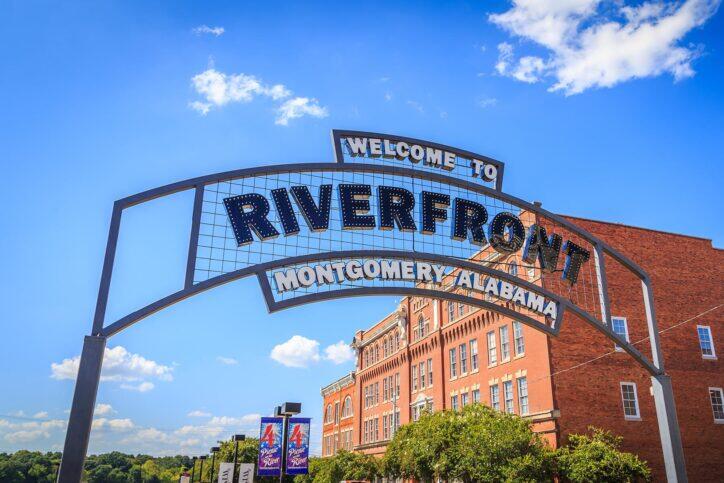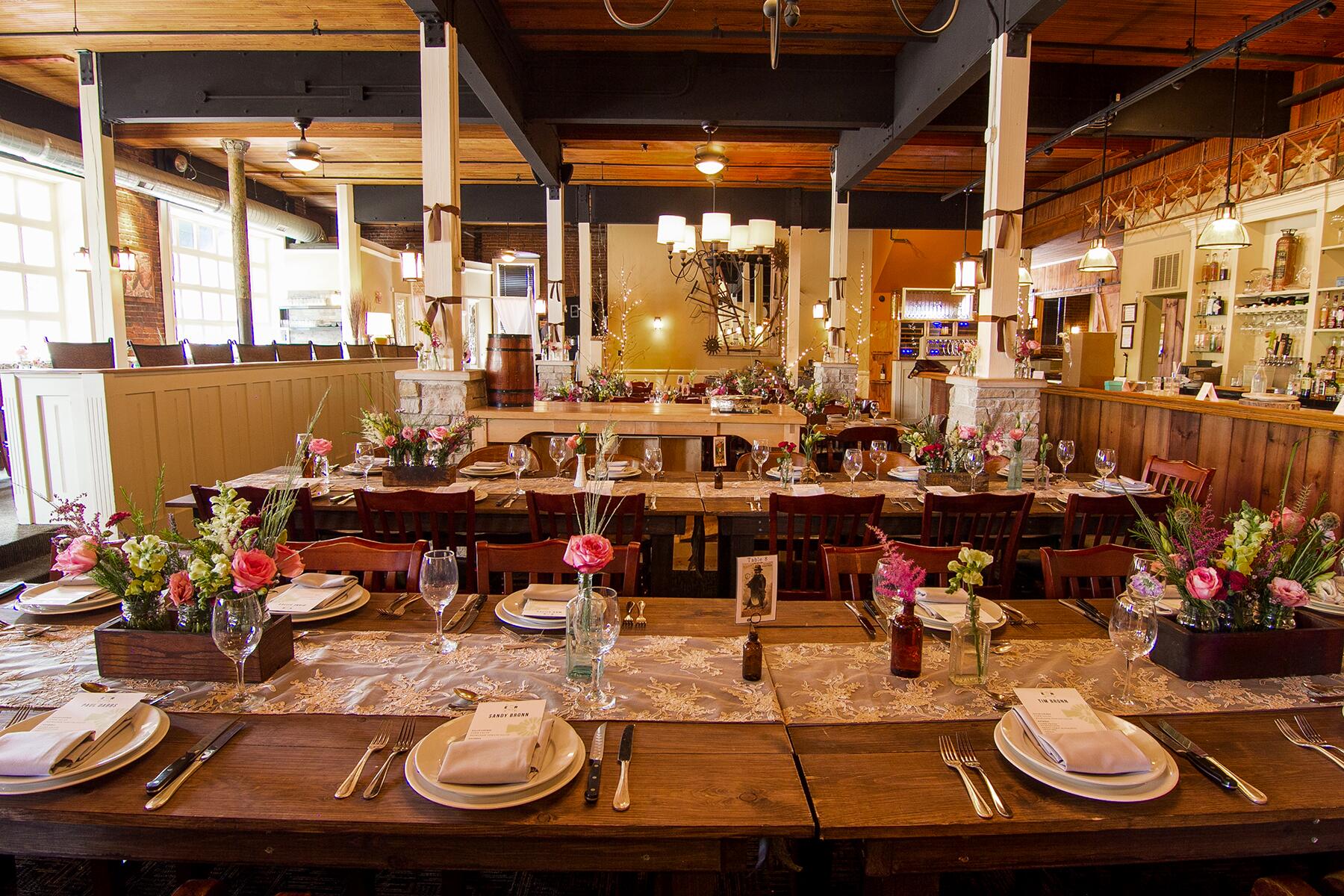Our new series on weekend road trips aims to inspire you for what's to come as we slowly return to travel.
Covid-19 Disclaimer: Make sure to check the status of the states, regions, and establishments in which you’re planning to visit prior to travel. Many regions continue to see high infection rates and deaths, while many states and counties remain under varying stay-at-home orders. Those traveling from areas with high rates of Covid-19 should consider avoiding travel for now in order to reduce spread.
You must work a bit to get to Alabama’s capital. Although it’s about halfway between Atlanta and Mobile (via I–85), it’s not really on the way to anywhere else. However, it’s well worth your time to make this trek, which has become a pilgrimage of sorts for those interested in The National Memorial for Peace and Justice and the Legacy Museum, bringing some 400,000 visitors to Montgomery in their first year.
Once you arrive, you’ll find a city that hasn’t exactly reached hot-spot status but is certainly becoming a destination to be reckoned with. Few cities have done a better job of laying out the stakes of the Civil Rights movement than Montgomery, which is both acknowledging and reckoning with its role in the slave trade and slavery. After all, this is where the Civil Rights movement was born, where Martin Luther King, Jr. preached, and where the Equal Justice Initiative, one of the country’s most successful legal aid organizations, is currently seeing much success. With good food, fun bars, and plenty of other activities, prepare for a jam-packed three-day weekend.
Recommended Fodor’s Video
GETTING THERE
Atlanta is 160 miles northeast of Montgomery, a fairly brisk 2.5-hour drive via I-85 south. If you leave fairly early, you’ll be in Montgomery in time for an early lunch.
If you are planning a long weekend, try to arrive early enough on Friday or Saturday to do a little touring, ideally by late morning. A fitting place to begin your Montgomery visit is the King Memorial Baptist Church on Dexter Avenue, where Martin Luther King, Jr., was pastor during the Montgomery bus boycott. The church is within easy walking distance of all the downtown hotels. You can tour the church and also the Dexter Parsonage Museum on South Jackson Avenue, a few blocks away, where the King family lived during their time in Montgomery. If you are short on time, book a timed tour in advance (the last Friday tour is at 3 p.m.), but walk-ins are accommodated if they have room; allow an hour for the church, two if you visit the parsonage.
Nearby, on Washington Avenue, is the Maya Lin–designed Civil Rights Memorial that sits in front of the Civil Rights Memorial Center. If you have time, definitely go inside to see the exhibits, the Wall of Justice, and to watch the short film on the Civil Rights Movement. Set aside an hour for this visit.
By this time, you may be ready for a break. Take it at Chris’ Hot Dogs, which has been selling hot dogs, hamburgers, chili, chicken salad, and a few other things since 1917 at its location on Dexter Avenue. You will not be disappointed if you get your dog with chili sauce. If coffee is more your thing, then you’ll find Prevail Union, a modern coffee shop in the old Kress building, also on Dexter Avenue.
If you still have time and the literary inclinations, you may wish to make the pilgrimage to the Cottage Hill neighborhood to see the historic Scott and Zelda Fitzgerald Museum. Zelda was born in Montgomery in 1900 (her childhood friend Tallulah Bankhead was born there in 1902), and she and Scott came back to Montgomery to live for about six months from 1931 to 1932 in this house, when he was writing Tender Is the Night and Zelda began work on her only published novel, Save Me the Waltz. On display are some of Zelda’s paintings, Scott’s books, various possessions, and even clothing.
If you prefer spending some time strolling and shopping, try Cloverdale, which is home to several locally-owned shops, galleries, restaurants, and other businesses along East Fairview Avenue. The area’s large, historic homes may be familiar to you if you’ve seen the movie Big Fish, which was filmed here in 2003. You can also take a break at Cafe Louisa, a bakery that also serves great coffee.

Downtown Montgomery doesn’t roll up the sidewalks at night. In fact, downtown is home to many popular bars and restaurants, including Montgomery’s only production brewery, Common Bond. You can have a pint or a flight, and if you’re hungry bring over something from Bibb Street Pizza Company, next door. If you’re looking for a more formal dinner, downtown has many other choices, including Wintzell’s Oyster House, a branch of the Mobile original, and Central, one of the city’s most popular upscale restaurants, which specializes in steaks, chicken, and fish from its wood-fired oven. If you’re not ready to call it a night, Aviator Bar, also downtown, is a local favorite.
You’ll want to set aside a day for Montgomery’s two signature attractions, The Legacy Museum and the National Memorial for Peace and Justice, which you can visit in either order. The museum is busy enough that you’ll need a timed ticket, and you may want to go early because it can be very busy, especially on weekends. The museum, housed in a former slave warehouse, covers lynching, racial segregation (“Jim Crow”) laws, and mass incarceration, the three primary successors to slavery in the United States. It takes a while to digest all there is to see and read here, and it’s well worth every moment you spend.
After the museum, you’ll need a break to decompress and unwind. You can sit in the adjacent cafe, which shares space with a wonderful bookstore, or you can head out to lunch somewhere like Martin’s (if you are looking for delicious fried chicken, this is definitely your spot). Unfortunately, it’s not open on Saturday. If you have a car and don’t mind driving a bit, Southern Comfort in Hull (out near the airport) is a popular spot for barbecue and other southern comfort foods (including its own pretty good fried chicken), and it’s open every day.
When you’re ready, head back downtown and visit the National Memorial for Peace and Justice, which documents and memorializes the thousands of lynchings that occurred since the Civil War. The memorial, set on six acres, demands a slow pace, which is fitting for the subject matter. A slow walk through the memorial takes at least 60 to 90 minutes.
Have dinner at Vintage Year in the Cloverdale neighborhood, a favorite special-occasion spot in Montgomery that began as a wine shop. The wine list has won awards, while the restaurant’s food has been recognized by the James Beard Society. You’ll need reservations. After dinner, if you aren’t ready for bed, head over to Leroy, also in Cloverdale. It may look like a dive, but you’ll find a surprisingly long list of craft cocktails and 18 beers on tap. If you are looking for a little Williamsburg, Brooklyn atmosphere in Montgomery, you’ll find it here.
You aren’t done with Montgomery yet. Your final day can go in any number of directions, but if it’s Sunday, you won’t want to miss the chance to have a good southern breakfast.
If you can manage to get up early (and even if you can’t), head over to Cahawba House to fortify yourself for the day. Breakfast is served from 6:30 to 10:30 a.m. If you’re looking for some delicious biscuits and gravy, grits, cinnamon beignets, locally made jams and jellies, or Conecuh sausages, you may find yourself standing in a long line to order at the counter. It’s definitely worth the wait.
Just around the corner is the NewSouth Bookstore, an excellent source for anything related to Southern history or literature. They will also be happy to give you advice on what to see and do.
The final don’t-miss attraction in Montgomery is the Rosa Parks Museum, which offers a look at the beginning of the Civil Rights era. The museum is not just about Ms. Parks but rather all the people and events associated with the year-long Montgomery bus boycott that lasted from December 1955 to December 1956. If you have time, it’s a short walk over to the Freedom Rides Museum, in Montgomery’s former Greyhound bus station. These museums are worth at least an hour, perhaps more.
If you are interested in Alabama history, you are in luck. There’s the Museum of Alabama, which covers the history of the state in some detail. It’s near the Alabama State Capitol (the building is open weekdays and Saturdays, and there are regularly scheduled guided tours on Saturdays). You may especially want to visit the Goat Hill Museum Store inside the Capitol building.

Are you are a baseball fan? If you are visiting between April and August, there’s a pretty good chance the Montgomery Biscuits will be playing during your visit. The games are held in the Montgomery Riverwalk Stadium. How about Hank Williams? The native son is memorialized in the Hank Williams Museum in downtown Montgomery.
Whatever you do, try to find time to get out to Capitol Oyster Bar. It’s decidedly off the beaten path but has a scenic, riverfront location and is a wonderful destination for fresh fried seafood at lunch and dinner, open Wednesday through Sunday. On Sundays, you’ll almost always find some kind of blues performance around 5 p.m., which typically has a cover charge (though you can eat inside without paying the cover).
WHERE TO STAY
Downtown Montgomery has several good hotels and this is the easiest place to base yourself for a long or short stay. If you’re looking for modern comforts, you can choose from a Doubletree, Hampton Inn & Suites, and Renaissance. Several other hotels are in development. If you are looking for atmosphere, look no further than the Scott & Zelda Fitzgerald Museum in the Cottage Hill neighborhood, which operates two Airbnb units upstairs.
WHEN TO GO
Montgomery has viciously hot summers, so keep that in mind when planning a trip. Alabama can have nice winters, with mostly cold nights and cool days. To maximize your time and opportunities for good food, remember that some of the city’s best local breakfast and lunch spots are closed on Saturdays.





